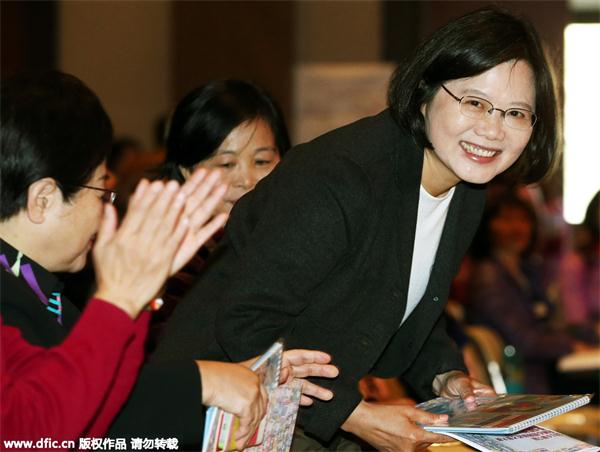Maintaining peace across Taiwan Straits can benefit all
Updated: 2016-01-21 08:15
By Douglas Paal(China Daily)
|
||||||||
 |
|
Democratic progessive party leader Tsai Ing-wen attends to the talent competition of children with mental disabilities in Taiwan. [Photo/IC] |
Tsai Ing-wen, candidate of the Democratic Progressive Party, won Taiwan's leadership election on Saturday. The elections in Taiwan have the potential to lead to strains among the US, Chinese mainland and Taiwan for the first time in over seven years.
Parallel interests in all three leaderships do not fundamentally clash, leaving space for careful and creative management of the Taiwan political transition. But there is enough suspicion and mistrust across the Taiwan Straits that a vicious circle of action and reaction cannot be ruled out and probably should be subject to active policy prevention.
It is important at the outset to note that the policy objectives of all three sides in some way call for the maintenance of peace and stability across the Taiwan Straits. For the US government, this should form the core of its private and public messaging as events unfold. Steadiness will be required as both the Chinese mainland and Taiwan will persuade Washington to help each to restrain or mollify the other. If the US does not grasp and establish its own principled position from the outset, it risks entrapment by events. That position starts with the formal and almost ritual adherence to the three Sino-US communiques and the Taiwan Relations Act (TRA), but it may have to adapt quickly to changing circumstances.
The Chinese mainland will look for public indications that Tsai has taken seriously the mainland's repeated warnings that the basis for continued cross-Straits cooperation lies in an acknowledgement of the concept of One China, however formulated.
It is at this juncture that US policymakers will need to kick in. It is in the US interest that Tsai continue the moderate, even conservative and reassuring approach to cross-Straits affairs that she adopted before the election. Her posture this time toward cross-Straits relations is markedly more constructive in terms of maintaining the status quo than her ambiguous stance in 2012, and this deserves to be recognized.
Tsai's revised posture won her American acquiescence to her candidacy after a visit to Washington in 2015. That was something she failed to achieve in her 2012 unsuccessful bid for the leadership. Washington seemed persuaded, temporarily at least, that she had developed safe hands to manage cross-Straits policy.
Some in the US and other circles, including in Japan and Taiwan, argue that Washington should seize the change in Taiwan to raise the level of official dealings in US-Taiwan relations, embed Taiwan in the "rebalance" to Asia, and promote closer security cooperation among Japan, the US, and Taiwan.
That is an option, but in light of the increasingly interdependent agendas of the US and Chinese mainland, and the extreme sensitivity of issues involving sovereignty for the Chinese, pursuing such an option would be fraught with costs difficult to predict or control. For the Barack Obama administration, on its way out and in search of a positive legacy, this seems an unlikely choice.
The Chinese mainland will naturally have its own levers to try to influence Tsai's government. The mainland will have four months to signal publicly or communicate privately warnings or inducements to shape Tsai's cross-Straits policy choices.
There are hints that Tsai's team is preparing to manage any such setbacks. They may seek US criticism of the moves. The best public US response is probably to revert to a desire to see peace and stability maintained in the region and to repeat the mantra of the communiqués and the TRA.
The Taiwan election has already caught the attention of some of those running to succeed Obama. But on the whole, the Chinese mainland and Taiwan are relatively subordinate to the Middle East, the Iran nuclear agreement, Russia-Eastern Europe relations, and other hot button issues in this US election. The Chinese mainland would be smart to remind itself of that fact and contain its instincts appropriately with respect to managing the transition with Taiwan.
The author is vice-president for studies at the Carnegie Endowment for International Peace.
- Global health entering new era: WHO chief
- Brazil's planning minister steps aside after recordings revelation
- Vietnam, US adopt joint statement on advancing comprehensive partnership
- European border closures 'inhumane': UN refugee agency
- Japan's foreign minister calls A-bombings extremely regrettable
- Fukushima impact unprecedented for oceans: US expert

 Stars of Lijiang River: Elderly brothers with white beards
Stars of Lijiang River: Elderly brothers with white beards
 Wealthy Chinese children paying money to learn British manners
Wealthy Chinese children paying money to learn British manners
 Military-style wedding: Fighter jets, grooms in dashing uniforms
Military-style wedding: Fighter jets, grooms in dashing uniforms
 Striking photos around the world: May 16 - May 22
Striking photos around the world: May 16 - May 22
 Robots help elderly in nursing home in east China
Robots help elderly in nursing home in east China
 Hanging in the air: Chongqing holds rescue drill
Hanging in the air: Chongqing holds rescue drill
 2.1-ton tofu finishes in two hours in central China
2.1-ton tofu finishes in two hours in central China
 Six things you may not know about Grain Buds
Six things you may not know about Grain Buds
Most Viewed
Editor's Picks

|

|

|

|

|

|
Today's Top News
Liang avoids jail in shooting death
China's finance minister addresses ratings downgrade
Duke alumni visit Chinese Embassy
Marriott unlikely to top Anbang offer for Starwood: Observers
Chinese biopharma debuts on Nasdaq
What ends Jeb Bush's White House hopes
Investigation for Nicolas's campaign
Will US-ASEAN meeting be good for region?
US Weekly

|

|








